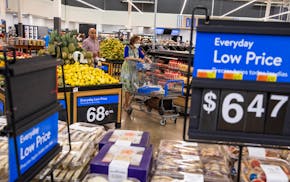When prices quickly rise, so do consumer suspicions — especially amid a natural disaster or public emergency like a global pandemic.
But when are price increases justifiable and when is it price gouging by a bad actor? Legislators are working this session to find a legal definition for "unconscionably excessive prices" during emergencies that they hope will appease consumer advocates as well as businesses.
"It's a lot of different groups coming together to help define what a super irregular price increase would be," said Tamara Nelsen, executive director of AgriGrowth, a nonprofit advocate for the state's food and ag industry.
A bill introduced in the Minnesota House of Representatives and Senate states: "During an abnormal market disruption, a person is prohibited from selling or offering to sell an essential consumer good or service for an amount that represents an unconscionably excessive price."
The bill would set a $10,000-per-sale civil penalty for those violating the law, with the state Attorney General's Office in charge of pursuing claims.
The "abnormal market disruption" is described as a state of emergency and "an increase in the price for an essential consumer good or service that exceeds 30% within a seven-day period."
Prices are considered excessive if the disparity between the cost of the item and the price charged "is not substantially attributable to significant additional costs outside of the seller's control," among other factors.
"Everyone is trying to constantly adjust to the price increases they're seeing in their own supply chain — and the increase in wages and shortage of workers," Nelsen said. "The bill language really sets guardrails on what the requirements are for price gouging."
A similar measure passed the House last year but failed to advance in the Senate; those tracking the bill says it has a better chance of passing this year.
"Minnesota is one of only 13 states that doesn't have a statute protecting consumers against price-gouging by businesses," Minnesota Attorney General Keith Ellison said. "I'm urging the Legislature to quickly pass a much needed anti-price gouging law."
Business groups, while not explicitly backing the bill, said having a clarified definition can help business owners know what is expected of them during emergencies as opposed to executive orders that may impose varying standards.
"Having rules everyone can look at and live by is better than handling these situations on an ad-hoc basis," said John Reynolds, Minnesota director for the National Federation of Independent Business. "We want to make sure we are protecting small businesses. If the cost for a hardware store to acquire a piece of plywood goes up 20 percent, that has to be passed through or there isn't going to be plywood."
The group urged legislators to remain focused on "declared emergencies and flexibility to make price adjustments based on ... the emergency."
Bruce Nustad, head of the Minnesota Retailers Association, said the intent is to "provide protections against a bad actor."
"It's not a price regulation. It's a bill that relates to a state of emergency," he said.
Nelsen said she understands the frustration consumers have when they encounter prices well above expectations, and when it's not always obvious why that might be.
"If you see a doubling in price on eggs or gasoline, it is always a factor of much complexity," Nelsen said. "And I've rarely ever seen it be one unit of the marketing chain trying to make a profit."
Farmers and producers have been battling higher prices for feed, fuel and land for years, which worsened with the pandemic, supply-chain struggles and the war in Ukraine. Manufacturers are paying more for raw ingredients and labor. And retailers can't stay in business if they don't cover increasing costs with increased prices.
"When people have a better understanding of what's happening in their world," Nelsen said, "with prices and inflation, longer term they're going to feel more comfortable researching and analyzing the next problem and maybe preparing for it rather than reacting with anger."

Ramstad: Readers say Walmart won't be paying the ultimate price of Trump's tariffs

How Minnesota businesses can spot and prevent invoice fraud
No place for cryptocurrency in retirement portfolios

Minnesota Department of Health rescinds health worker layoffs
